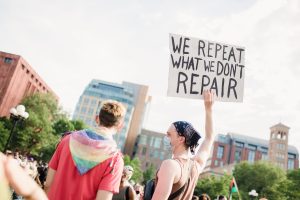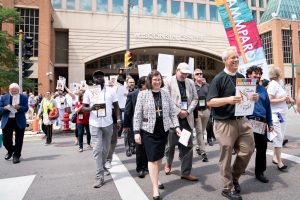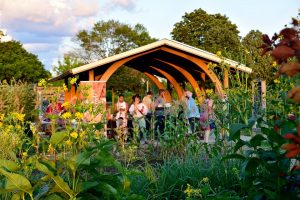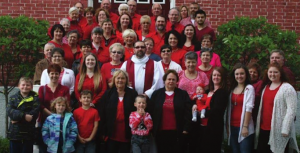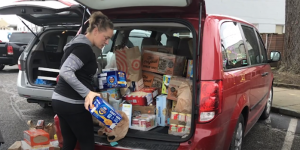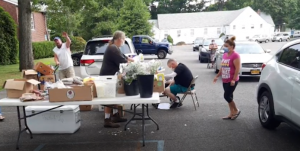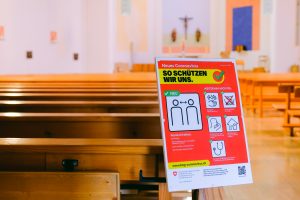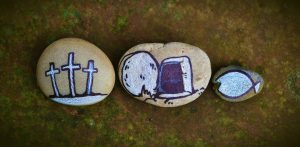These reflections are a part of ELCA World Hunger’s Sermon Starter series which is published via email every Monday. You can sign up for the weekly email here on the right side of the page if on a computer or near the bottom of the page if viewing from a phone. Pastor Tim Brown is the writer of these reflections. Pr. Tim is a Gifts Officer and Mission Ambassador for the Lutheran School of Theology at Chicago and a pastor and writer out of Raleigh, NC. You are invited to use the message below for personal devotion as well as prompts for sermon writing.
March 29- Fifth Sunday in Lent
Ezekiel 37:1-14
The enigmatic poet Emily Dickinson’s famous words are appropriate for a sermon that hangs off the Hebrew Scripture assigned to the day:
Tell the truth, but tell it slant
Success in circuit lies
Too bright for our infirm delight
The truth’s superb surprise
A lightening to the children eased
With explanation kind
The truth must dazzle gradually
Or every man be blind
“Tell the truth, but tell it slant…” is Dickinson’s prescription for a humanity that truly has trouble bearing too much reality, at least all at once.
And, Beloved, let’s be honest: there is tons of heavy truth in these days. Truth about this pandemic, truth about the health of our loved ones, concerning truth about the health of our congregations…too much truth.
I don’t suggest you tell it slant. I don’t suggest you bludgeon people, either.
All this heavy truth is perhaps why we have historically destroyed those who tell too much truth. In

ancient days they called them “prophets,” though you might not associate prophecy with truth-telling. So much of what passes for “prophecy” these days has to do with predicting the future, but that’s not actually what a prophet does, nor is it indicative of who a prophet is, at least in the Bible.
Prophets are truth-tellers.
Ezekiel was already a priest, but just being a priest doesn’t make you a prophet. Priests perform ritual acts, but prophets perform acts of truth-telling, often to powers that don’t want to hear it. Sometimes priests and prophets are one and the same…but it takes intention and risk.
And the book of Ezekiel is one of powerful truth-telling, using allegory to speak to Israel in a time of great confusion.
Because as he’s standing over this valley of dry bones God tells him to proclaim more truth: to the bones, and to the wind, forging an alliance between the human and the elemental to show forth God’s work in the world.
Is this not what we essentially do as pastors in the Rite of Baptism? Do we not prophesy to the human (the baptismal candidate) and the elemental (the water) at the urging of God to cause new life to enter into not only the human but the world writ large?
This text is a baptismal text. It’s a text about new life.
And what truths need to be told in these days of confusion? Perhaps there is a call to be honest and 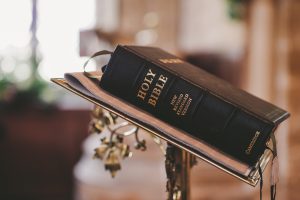 careful about human touch with Covid-19 spreading like wildfire. And, along with that call, perhaps the prophet in the digital pulpit would do well to remind people that this is not a “foreign” virus, as viruses don’t have nationalities, and we must resist language that pits humanity against each other, especially in times of crisis.
careful about human touch with Covid-19 spreading like wildfire. And, along with that call, perhaps the prophet in the digital pulpit would do well to remind people that this is not a “foreign” virus, as viruses don’t have nationalities, and we must resist language that pits humanity against each other, especially in times of crisis.
New life will come for the world, but we are called practice caution in these days. That’s some tough truth, especially for those who already don’t get their touch-needs met enough: the lonely, the aged, the stigmatized, and the unwell.
So maybe some truth-telling today might name that, in this time of social distancing, we must find safe ways to reach out to those who already feel distant. That’s some deep truth.
Deep truth-telling can change things, by God.
It’s even been known to make things that were once dead alive again.
Perhaps that’s why it gets another hearing at the Easter Vigil every year.
Prophets don’t tell the future, they tell the truth. In this Lenten season, what is the truth your assembly needs to hear, by God? And what is the truth they need to say to this world too often dominated by dry bones and hot air?
John 11:1-45
This reading is plagued by a lack of brevity, which only works against the preacher if you’re not imaginative with how you proclaim it. I suggest, if possible in this new reality, you split up the text between several voices. I know in our digital reality this would require some planning and coordination, but it is worth it.
And once the text falls on their ears, you then have the ability nimbly navigate this longer reading in a way that lands with more than sentimental impact. Sentimentality is one of the dangers of this text, I think. And in the world of proclamation, sentimentality is akin to pity: it deflects true emotion by keeping distance.
Because the truth of the Lazarus story is that Lazarus is dead. Very dead.
We know this because the writer goes to great lengths to note that Lazarus has been in the grave for four days. In ancient Jewish lore, the spirit of the deceased hovered around the tomb for no more than three 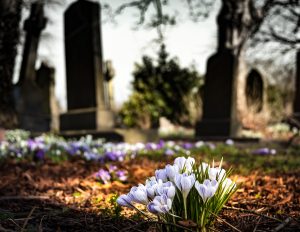 days (which, it is worth noting, John makes sure that Jesus actually does physical things post-resurrection, to show he’s not just a spirit appearing to people). The Gospel notes that Lazarus was there for four days, many hours past the time when he might have just been mistaken for dead, or that his spirit would appear.
days (which, it is worth noting, John makes sure that Jesus actually does physical things post-resurrection, to show he’s not just a spirit appearing to people). The Gospel notes that Lazarus was there for four days, many hours past the time when he might have just been mistaken for dead, or that his spirit would appear.
Lazarus is dead. And in these days of rising death-tolls, this can be difficult to claim and name. But it also might be necessary to investigate.
What are the dead places in our lives? Our feelings of safety and normalcy? Our healthcare system? Our trust in our government?
Or, perhaps in these intensive quarters, we’re realizing our relationships are dead or dying? Our jobs?
What used to have life, but is long past that now? These questions bounce around the text this Sunday morning.
A different sermon might find another avenue, though, through the way that both indignation and hope hold hands in the person of Martha. Mary, rightfully, seems full of grief and regret. But Martha holds out the candle of hope in the shadow of the valley of death, noting that Jesus can ask anything of God and God will provide.
The imagery of holding both indignation and hope simultaneously strikes me as timely in these days, even as the Earth warms, our politics continue to be divisive, wars continue, and mass shootings become far too regular.
Perhaps you and your online-assembly will resonate with that theme as well. How do we hold indignation in one hand and hope in the other, well? It’s worth asking and pondering together as a church.
Or perhaps your assembly needs to ask openly what is binding them and keeping them buried in these days. Is it a budget that can’t be met? Is it division in the pews? Or perhaps they’re tied to a past that is long dead or an uncertain future. Or maybe all of this and more.
Lazarus is unbound in today’s Gospel, and if you read just a bit more in the scriptures, you’ll find that in the next scene he’s serving Jesus. Not only are his bindings keeping him buried, but they’re keeping him from serving.
Maybe yours are, too.
There is so much to pull from this Gospel lesson. Pick an avenue and follow it down that holy path.
Children’s Message
This might be a good time to allay fears around COVID-19, and explore how God calls us to gather together safely. You’re probably giving this online, and wanting to strike a balance between providing perspective while not alarming them. Be cheery, but honest.
Have a box of tissues with you to lift up.
Alright, everyone, I brought something with me and I bet you know what it is.
Hold up the box of tissues
Right! Tissues. When do we use these? Give space to pretend for an answer. The children watching will understand this pause. It is part of many shows they already watch.
Right. When we have a runny nose, or we sneeze, or cough…when we’re sick.
Where is the best place to cough and sneeze if we don’t have a tissue though?
Give space to pretend for someone to answer.
Right! Doctors say that we should cough or sneeze into our elbows demonstrate so that we get good coverage over our mouth and nose with our arm.
We know that there is a virus going around. They probably have you washing your hands at home a lot right? Yeah, they want to make sure we’re all healthy and don’t spread it around.
God wants us all to be safe. So, many of us are staying at home. And in this time when we’re being careful not to spread things around, we still want to be safe, right? Because we don’t want people who are sick to get sicker or people who may be very old or very young to get sick, right?
So, for a little while, I want to show you how to say “Peace be with you” in sign language. It’s something that we can do when we share the peace with one another, so we don’t actually have to touch hands while  doing it. And I want you to send me videos of you doing it! Ready?
doing it. And I want you to send me videos of you doing it! Ready?
The sign for “peace” is made by putting your hands together and turning them over, then moving them apart in an inverted V. “With” is simply bringing two closed fists together. “You” is made by a simple point or gesture toward someone. You can find visual directions here: https://www.youtube.com/watch?v=moAv06flgEU
Practice this a few times with the youth, and then show them “Also with you!” which is just a simple point back at the person who offered you peace.
We want everyone to be healthy and safe. So, we can do this peace sign instead of actually shaking hands. Or, if you’d rather, you can bump elbows demonstrate or bow demonstrate or even just hold up your fingers in a V demonstrate.
In this church, even when we can’t be physically together, we care about people who need caring for, and in this time it’s those who may get sick because we’re having too much contact. So, let’s practice safe ways of communicating!
Right now, let’s practice. Send me a short video of you giving the peace to someone using sign language, or bumping elbows, or bowing, or whatever way I just showed you. God wants us to be in community safely, so let’s do this for a little while!
Post the videos with permission. For other resources, you can check out the ELCA recommendations here: https://www.elca.org/publichealth
 bill and was extremely happy because it was enough to provide someone with a chicken! I have a Bachelor of Arts in International Studies with minors in Music, German, and Justice, Law & Public Policy from Wittenberg University. Most recently, I served with the Peace Corps as an HIV/AIDS and Adolescent Health Educator in Lesotho until operations were suspended globally, due to the COVID-19 pandemic.
bill and was extremely happy because it was enough to provide someone with a chicken! I have a Bachelor of Arts in International Studies with minors in Music, German, and Justice, Law & Public Policy from Wittenberg University. Most recently, I served with the Peace Corps as an HIV/AIDS and Adolescent Health Educator in Lesotho until operations were suspended globally, due to the COVID-19 pandemic. where all are fed. In the summer of 2018, I interned for AMMPARO, a team located in the ELCA’s Global Mission Unit. I am so excited to be involved with the ELCA once again! After graduating from Wheaton College with a degree in International Relations in May of 2019, I left for Sierra Leone as a Peace Corps Volunteer. This is where I had been for the past year until being evacuated because of COVID-19. In Sierra Leone, I taught English and mathematics at an all-girls middle school.
where all are fed. In the summer of 2018, I interned for AMMPARO, a team located in the ELCA’s Global Mission Unit. I am so excited to be involved with the ELCA once again! After graduating from Wheaton College with a degree in International Relations in May of 2019, I left for Sierra Leone as a Peace Corps Volunteer. This is where I had been for the past year until being evacuated because of COVID-19. In Sierra Leone, I taught English and mathematics at an all-girls middle school.

